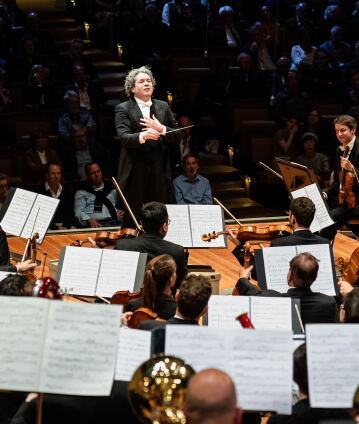Gustavo Dudamel conducts Mahler’s Sixth

“The Sixth is his most personal work and a prophetic one as well,” according to Gustav Mahler’s wife Alma. With its apocalyptic musical language, which brightens only temporarily, the Symphony seems to anticipate personal disasters: heart disease, the death of his daughter, professional setbacks. The Tagesspiegel had this to say about the Berliner Philharmoniker’s performance with Gustavo Dudamel: “This is not a concert. It is an existential experience. An overwhelming one.”
“Mahler’s music creates a very special atmosphere,” thinks Gustavo Dudamel. “The colours of nature and the spatial feeling you get with Mahler – it’s very extraordinary, almost like 3D music. It’s not just that you hear things, you feel them, you sense how these elements surround you.” In the Sixth Symphony, there are many of these moments in which “sounds of nature” and “spatial sound” come together, including in the sections in the opening movement of the Sixth Symphony in which cowbells placed far away from the orchestra are played “in realistic imitation of the bells of a grazing herd, sometimes united, sometimes isolated from a distance”: captivating visions of alpine solitude and distant islands of a dreamed-of paradise.
The Sixth is the most pessimistic of all Mahler’s symphonies: music that is driven forward by a relentless march character from which there is no escape. The performance markings in the score – “garish”, “wild”, “raw!”, “as if whipped”, “as if driving furiously”, “like an axe blow”, “everything with brute force”, “powerfully” – speak for themselves. In this work, Mahler composed an obsessive vision of doom, which culminates in the famous hammer blows in the thunderous finale. What Thomas Mann wrote about Adrian Leverkühn’s fictional oratorio Dr Fausti Weheklag applies here: “No, this dark tone-poem permits up to the very end no consolation, appeasement, transfiguration.”
© 2024 Berlin Phil Media GmbH
Related interviews
Artists
Our recommendations
- Gustavo Dudamel conducts Mahler’s Fifth Symphony
- Gustavo Dudamel conducts “Also sprach Zarathustra”
- Gustavo Dudamel conducts Mahler’s Third Symphony
- Gustavo Dudamel with Mahler’s Fifth Symphony
- Gustavo Dudamel conducts Dvořák’s Symphony “From the New World”
- Gustavo Dudamel conducts Mozart and Mahler